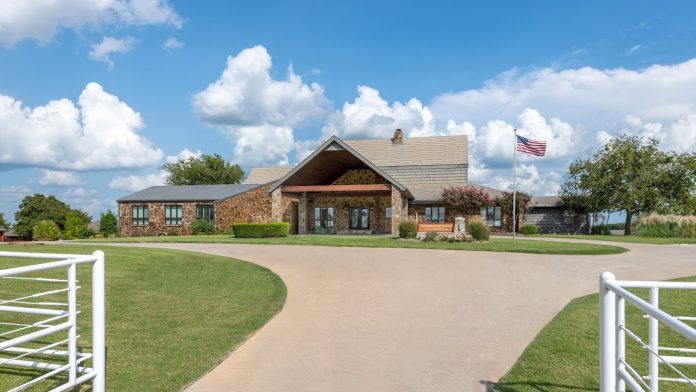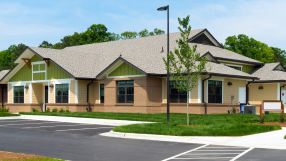Enterhealth Ranch Residential Treatment Facility
524 North Lincoln Park Road
Van Alstyne, TX 75495
Van Alstyne, Texas
800-388-4601
Get Help Now - 972-200-2207
 Who Answers?
Who Answers?

Amenities

Gym
When paired with cognitive-behavioral therapy, exercise can be an effective tool for overcoming addiction. Dru...g rehabs with a gym offer clients healthy ways to increase energy levels, balance the body’s stress hormone levels, and aid in the brain’s healing process.Read More

Private Rooms
In order to maintain a sense of autonomy, many private rehab facilities offer clients the ability to choose th...eir own private rooms. The privacy and personal space ensure that the recovery process is as comfortable as possible.Read More

Private Rehab
Private drug rehab provides a comfortable, secure environment that allows you to focus on doing the work to ge...t your life back on track. Benefits include a higher staff-to-client ratio, increased one-on-one time with therapists and healthcare providers, private rooms for clients, and customized forms of therapy.Read More

Swimming Pool
Swimming increases blood flow to the body and brain, boosts white blood cells, and improves muscle strength, l...ung capacity, and overall stamina. Drug rehabs with a swimming pool offer physical and mental benefits to complement the recovery process.Read More

Yoga Studio
Treatment centers with a yoga studio offer a special form of holistic therapy during the recovery process. Yog...a boosts mindfulness, a sense of calm, and healthy reflection during drug rehab via breathing exercises, stretching, and a progression of specific postures.Read More
Addiction Treatment Programs
Adult Program
Alcoholism
Cognitive Behavioral Therapy (CBT)
EMDR Therapy
Men's Rehab
Opioid Treatment
Women's Rehab
Teen & Adolescent Program
Adult Program
The Lone Star State offers a host of options for those in search of an adult program in Texas. From inpatient to outpatient care, adults can find a program that meets their needs for effective treatment of substance use issues.Alcoholism
When you enter alcohol rehab in Texas, you’ll find support systems to help you on your recovery journey. Professional counselors, physicians, and other people in recovery provide services and support to help you make changes and learn how to enjoy a sober lifestyle.Cognitive Behavioral Therapy (CBT)
The goals of cognitive behavioral therapy in Texas include evaluating thoughts and changing thinking patterns that are leading to substance use. This treatment helps participants understand their motives and problem-solve to work through challenges without the use of substances.EMDR Therapy
EMDR Therapy is a neurobiological treatment modality used to address trauma disorders and related mental and behavioral health challenges. Short for eye movement desensitization and reprocessing, EMDR is designed to help clients cope with distressing memories and emotions, including fear, sadness, and anger. EMDR may help clients in addiction recovery manage the psychological and emotional triggers that contribute to substance misuse and/or addiction relapse.Men's Rehab
Men’s rehab in Texas can create an environment that makes men more comfortable. Many men in Texas seek out this type of treatment for its gender-specific benefits.Opioid Treatment
Through therapy, counseling, and medication assisted treatment, individuals in opioid rehab in Texas gain the skills they need to live a healthier life. The goal is to help you take control of your life and prevent relapse.Women's Rehab
Many gender-specific issues must be addressed during addiction recovery. Women’s rehab in Texas provides the appropriate support for women’s challenges such as body image, motherhood, and trauma.Teen & Adolescent Program
The goal of a young adult program in Texas is to set young people free from the effects of addiction and give them the skills they need to successfully navigate early adulthood. This is accomplished with age-appropriate settings, therapies, and activities.Levels of Care
1
Detox & MAT
Detox in Texas is your first step toward a drug-free future. During this phase, your systems are cleansed of a...ll addictive substances. You’ll receive 24/7 care, which may include medication to alleviate withdrawal symptoms.Read More
2
Inpatient Rehab
Inpatient drug rehab in Texas can last from a few weeks to mor than 90 days. During that time, you live at the... facility and receive round-the-clock supervised care. Treatment typically includes individual and group therapy.Read More
3
Aftercare & Alumni Program
The initial weeks and months after rehab treatment are often the most difficult. Aftercare rehab in Texas is d...esigned to help you successfully navigate these challenging times and maintain sobriety. You’ll receive emotional, mental, and practical supports, for up to a year or more after treatment.Read More
4
Dual Diagnosis & Mental Health
A dual diagnosis treatment center in Texas provides programs for people who struggle with both substance abuse... and mental illness. Treating both disorders through an integrated approach is essential for recovery.Read More
5
Drug & Alcohol Intervention
A valuable tool for drug rehab in Texas is intervention services. This treatment tool provides education and r...esources on how to stage an effective intervention as well as professional assistance with facilitating the intervention. Staff then follow up with support to develop an effective treatment plan.Read More
Accreditations

Joint Commission
Insurance
 Private Insurance
Private Insurance
If you have private insurance, you can use it to help cover the cost alcohol and drug rehab in Texas. The amou...nt covered may depend on your policy and whether the treatment center is in-network or out-of-network. You may be left with some costs like a co-payment, or co-insurance. Check with your insurer for more information.Read More
 Self-Pay Options
Self-Pay Options
You have the option to pay for your alcohol and drug rehab in Texas, out-of-pocket (also called self-pay or pr...ivate pay). Self-pay allows you to take control of the cost of your recovery journey and gives you access to all levels of care — including detox in Texas, and inpatient rehab in Texas — that might otherwise be limited by insurers or government-run programs.Read More
Contact Enterhealth Ranch Residential Treatment Facility

Location Details
Other Nearby Facilities

Infinite Recovery Austin
6404 Ridge Oak Road
Austin, TX 78749

Austin Drug and Alcohol Abuse Program Austin
7801 North Lamar Boulevard Suite D-109
Austin, TX 78752

Brownsville Community Health Center
191 E Price Rd
Brownsville, TX 78521

Serenity House Abilene Treatment Facility
1546 N. 2nd Street
Abilene, TX 79601